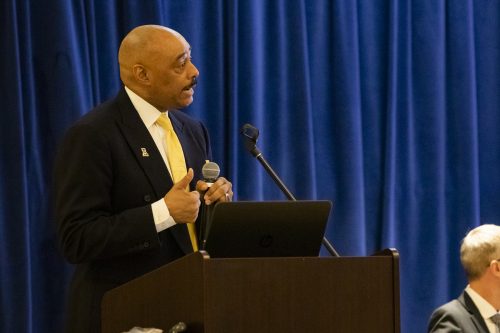Friday Focus: Leadership and intergenerational decisions
March 7, 2019

— by Keith Champagne, vice chancellor for student affairs
As a student affairs leader, I engage in the decision-making process knowing, thinking and understanding that my decisions will impact future generations of students and student affairs personnel. In fact, as leaders, we are required to make “intergenerational” decisions that influence and impact multiple generations of students and employees whom we will never know but whom we may have an affinity for or identification with.
Now, some of you may be wondering, what is “intergenerational leadership”? According to leadership scholars Kimberly Wade-Benzoni and Morela Hernandez, “Intergenerational leadership is when executive and senior leaders make decisions that might affect and/or impact multiple generations of people they will never meet and they are tasked with designing organizational systems and structures that stimulate the on-going welfare of the organization and its stakeholders.” Hence, intergenerational leadership and decision-making are when current leaders willingly sacrifice their own self-interest to promote long-term institutional or organizational well-being.
Wade-Benzoni and her colleagues state that moral emotions can contribute to the creation of positive cycles of intergenerational reciprocity, building the foundation for positive intergenerational systems. This occurs through two pathways: 1.When decision-makers have experienced or witnessed benefits from the actions of previous generations; and 2.When the decision-makers have experienced or witness burdens from the actions of previous generations.
For example, I knowingly made the decision to move from a “Dean of Students” model to a “Center for Student Rights and Responsibilities” with the intent of moving from the “dominant” student conduct model to one of a shared responsibility, and balancing the university’s authority with student freedom, all with the goal of creating a caring and responsive system for students in a modern university environment. The rationale for my decision was based on the actions of the past and on my identification with future generations of UAF students, and with the goal of establishing a process and system to benefit the greatest number of students in the future.
Furthermore, in my previous Friday Focus, I wrote about a values-based leadership framework that allows me to engage in both transformational and adaptive leadership when presented with challenges based on declining or low enrollment, retention and completion rates. Before making a decision on a strategy to address this enrollment management problem, I had to seriously consider the short- and long-term goals and the future impact and consequences of a selected strategy on the Division of Student Affairs and the university. Thus, we decided to engage in a universitywide strategic enrollment planning process.
This is another example of a leadership decision that will have a major impact on current and future generations of students and employees of the university based on the cost and expected benefits and results. I made the decision to pursue and implement the strategic enrollment planning process based on my appreciation, understanding, respect and value for the associate vice chancellor for enrollment management and her highly functioning team in Admissions, Financial Aid, Department of Veteran and Military Affairs, and the Registrar’s Office. My decision was truly based on not just the current benefits to me as a leader but for the future benefits and cost to the future generations of student affairs and enrollment management staff and UAF students. In essence as a leader, I made an intergenerational decision that will affect the division, university, and its students and employees for years come.
In the Division of Student Affairs, we use the abilities, experiences, expertise and core competencies of our staff and resources to solve heterogeneous problems with all diligence and deliberate speed and agility in a manner that will positively affect future generations of students and staff for years to come. In addition, this is done with due consideration analytically, emotionally, psychologically and culturally, with an eye toward the intergenerational benefits for the present and future generations who may be affected by the intended and expected long-term results systemically and institutionally.
Consequently, as we at the university respond to the demands of a changing external environment and a new political and economic landscape in the state and the country to ensure that UAF remains financially viable, I ask that we in executive leadership positions make intergenerational decisions with the present and future generations of students, faculty and staff in mind.


